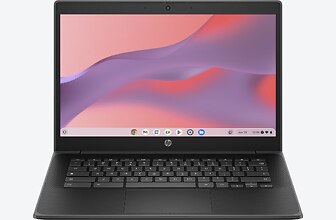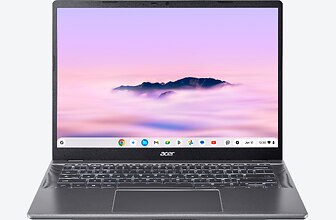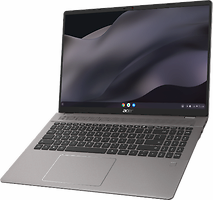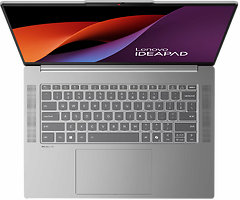Chromebooks
 © Unsplash
© Unsplash- Storage: Cloud Integration through Google Drive
- Hardware is Less Relevant than the Price
- Convertible Chromebooks: Touch-Screen usable with Pen
Top 3 Chromebooks
 |  |  |
|---|---|---|
| HP Fortis G1i 14" (5P9U4EA) | Acer Chromebook Plus 514 CB514-5H-386T | Acer Chromebook Plus 514 CB514-5H-589G |
| £395,99 | £467,49 | £552,49 |
| Deal: On offer at HP Store Only while stocks last. More details in the retailer shop: | Deal: Now 15% Discount at Acer Store - EXCLUSIVE - ONLY HERE - 15% DISCOUNT AT ACER - only until 28.02.2026 | Deal: Now 15% Discount at Acer Store - EXCLUSIVE - ONLY HERE - 15% DISCOUNT AT ACER - only until 28.02.2026 |
| HP Store, incl. Shipping, Retailer details: — £482,40. Last lowest price in 30 days in our price comparison: 359,99 € | Acer Store, incl. Shipping, Retailer details: — £549,99. Last lowest price in 30 days in our price comparison: 422,49 € | Acer Store, incl. Shipping, Retailer details: — £649,99. Last lowest price in 30 days in our price comparison: 517,49 € |
| 14" IPS, multi-touchscreen, anti-glare, ips, 45% ntsc (1920 x 1080, Full-HD) | 14" IPS, matte (1920 x 1200, WUXGA, 60 Hz) | 14" IPS, matte (1920 x 1200, WUXGA, 60 Hz) |
| Intel Processor N150 / (4 Cores) | Intel Core 3 100U / 0,9 GHz (6 Cores) | Intel Core 5 120U / 0,9 GHz (10 Cores) |
| Intel UHD Graphics (Alder Lake 24EUs) | Intel UHD Graphics 64EUs | Intel Iris Xe Graphics G7 80 EUs |
| 8 GB RAM (LPDDR5X - 7500 MHZ) | 8 GB RAM (LPDDR5) | 16 GB RAM (LPDDR5X) |
| 128 GB SSD | 256 GB SSD | 512 GB SSD |
| 1,63 kg | 1,41 kg | 1,41 kg |
| - | 17 hours | 17 hours |
Storage: Cloud Integration through Google Drive
Chromebooks do not usually have huge hard drives, but SSDs have by now become established here. However, the devices are not designed for huge collections of data; the storage capacity is only up to a maximum of 512 GB. The majority of your virtual brain will then be stored in the Google Cloud, which has several advantages. The most obvious: your files are always available - and you'll appreciate that especially if you forget your USB stick at home at an important moment. The networked storage space also makes it easy for you to share your documents, presentations, Excel files, and photos with others. With Office suites in the browser, you can work with others at the same time, regardless of whether they are sitting next to you or kilometres away.
Popular Chromebook on our website:
Once you've finally decided to buy a Chromebook, it's not as difficult as with a Windows laptop. The choice of devices is quite limited, with only a handful of manufacturers such as Acer and HP having taken the bold step. This makes it all the easier for you to find the right Chromebook. Apart from the convertible models with Chrome OS, the desired size plays an important role. If you're looking for a very compact laptop, you've come to the right place with Chromebooks. There are some models with a 13-inch screen diagonal, while the other dominant form factor is 14 inches. The good thing is that you don't have to necessarily spend more money for a larger version.
Hardware is Less Relevant than the Price
The price is one of the strengths of a Chromebook. The entry barrier here is extremely low in a market-wide comparison, which not only attracts hardcore Googlers, but also those who like to experiment. It doesn't need many resources to power the browser operating system, which is why the hardware doesn't put too much strain on the normal-sized batteries. Battery life of more than ten hours is the standard. At the same time, manufacturers attach great importance to ensuring that the devices are as portable as possible. This is why the casings are often made of plastic, sometimes aluminium, and rarely weigh much more than 3 pounds.
Popular HP Chromebook:
That's why you shouldn't spend too much time comparing the hardware on the data sheets when looking for your new Chromebook. The Chromebook models from HP, Acer and the few other remaining manufacturers rely on processors from different manufacturers. The use of slightly less powerful processors is only justifiable in a laptop running Chrome OS, while you can expect significantly more powerful chips in a Windows laptops for little money.
Popular Acer Chromebook:
High-end Chromebooks are equipped with Intel Core i or AMD Ryzen processors. However, the economical operating system simply does not need huge processing power and therefore places more emphasis on low power consumption and thus an operating time that comparably priced Windows laptops can hardly keep up with. Only the memory (RAM) could be a metric you want to orientate yourself on. Basically, the more gigabytes of RAM your Chromebook offers, the more tabs and windows you can open at the same time.
Convertible Chromebooks: Touch-Screen usable with Pen
After Chrome OS had made a name for itself after a few years, the first attempts were made at convertibles. Unsurprisingly, this was an excellent idea as, together with the Google Play Store, the whole world of Android apps was open to them. Some models even support a stylus, which works perfectly with the many applications for drawing or photo editing. A Chromebook with a touchscreen starting at 400 pounds is not even that expensive. You can discover the variety of 2-in-1 hybrids with Windows in the Convertible category here at Your-Perfect-Laptop.co.uk.







